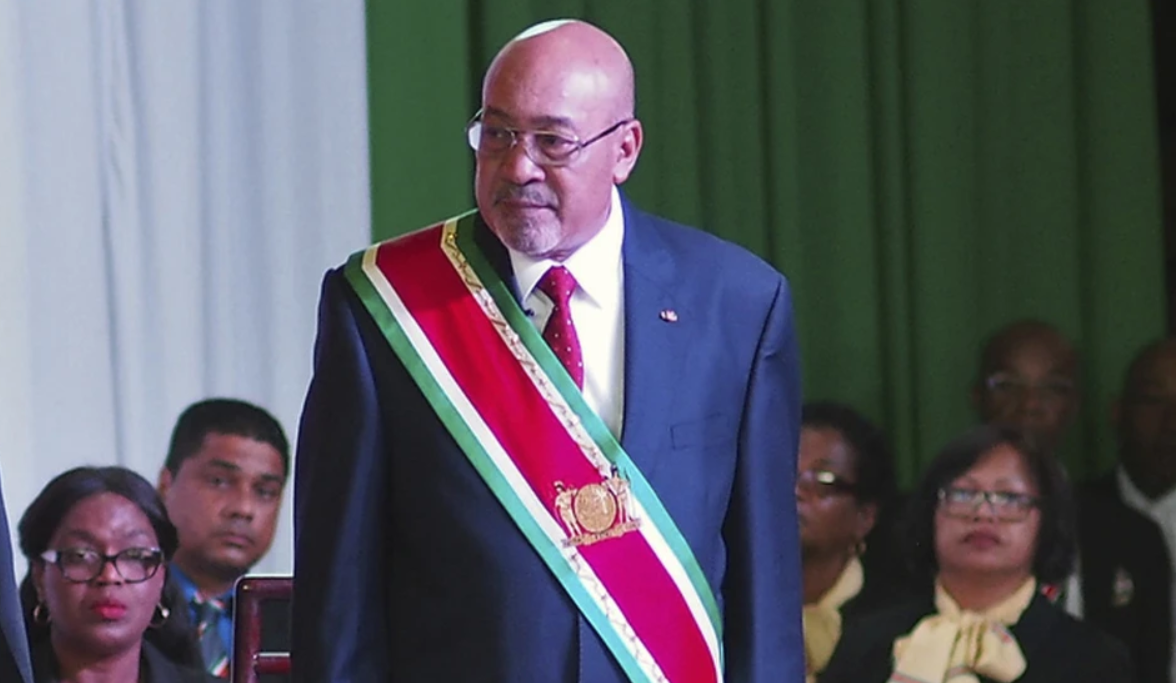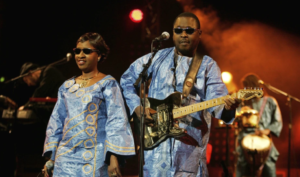Desi Bouterse, a former military leader who staged a coup in Suriname in 1980 and later returned to power through elections three decades later, has passed away at the age of 79. Bouterse had faced accusations of drug trafficking and murder during his time in power.
Surinamese Vice President Ronnie Brunswijk shared a post on Facebook Wednesday, acknowledging that Bouterse’s “life had a lasting impact on our country” and that his efforts would not be forgotten. The cause of death has not yet been revealed.
Bouterse was admired by supporters for his populist social programs and strong leadership, while his critics viewed him as a brutal dictator. In December 2023, he was sentenced to 20 years in prison for the 1982 murders of 15 political opponents. However, despite the conviction, Bouterse never served his sentence, having disappeared before the verdict was enforced.
Dutch historian Pepijn Reeser, who authored a biography of Desi Bouterse in 2015, stated, “No one has influenced the history of Suriname since its independence like Desi Bouterse.” Reeser noted that Bouterse was the first to bridge the significant social class divide that had previously characterized Suriname.
Pepijn Reeser, the Dutch historian who wrote a biography of Desi Bouterse, explained that before the 1980 coup, it was unimaginable for someone from the lower class to rise to become the most powerful figure in Suriname. However, Bouterse not only broke that barrier but also became the first post-colonial leader to resort to political violence and to use Suriname as a key point for illegal drug trafficking.
Early on Wednesday, dozens of Bouterse’s supporters gathered outside his wife’s home, visibly emotional with tears streaming down their faces. Many were wearing purple, the color of his political party.
Born on October 13, 1945, on a former sugar plantation near Paramaribo, Bouterse moved to the Netherlands in 1968, following the path of many Surinamese seeking better opportunities in Europe. At that time, Suriname was still a Dutch colony, and as a Dutch citizen, he was required to serve in the military. He joined the armed forces shortly after arriving.
Desi Bouterse graduated from the Royal Military School and served at various Dutch army bases in the Netherlands and Germany. He returned to Suriname just two weeks before the country gained independence on November 25, 1975, and joined its newly formed military. Initially, there was hope among the young military personnel to serve their country, but this quickly turned into frustration due to widespread corruption and favoritism under the government of Prime Minister Henck Arron. When Arron banned the troops from forming unions, 16 young soldiers, led by Bouterse, staged a coup on February 25, 1980, overthrowing the government and making Bouterse the de facto leader.
“We took control because we want to save this country from ruin. There needs to be a total change of mentality to transform Suriname into the paradise it used to be,” Bouterse told a journalist shortly after the coup.
However, when promised democratic reforms failed to materialize, opposition to Bouterse’s military regime grew rapidly. Tensions between the military and opposition groups led to the killing of 15 men on December 8, 1982. These victims included journalists, lawyers, military personnel, and university professors, and their deaths became known as the “December Murders.”
Eddy Wijngaarde, the brother of journalist Frank Wijngaarde, one of the victims of the December Murders, stated that the executions dealt a devastating blow to the rule of law in Suriname, a blow the country has yet to fully recover from. He added that the impact of the murders went beyond the deaths of the 15 men, as Bouterse used fear to maintain his power and advance his personal interests since 1982.
The killings shocked the Netherlands, leading them to suspend all development aid, which severely disrupted life in Suriname. In 1986, Ronnie Brunswijk, a former bodyguard of Bouterse, took up arms in an effort to overthrow the dictator. This sparked a six-year civil war in the country’s jungles, during which both sides committed human rights violations, and hundreds of people lost their lives.
Facing international isolation and dwindling domestic support, Bouterse agreed to hold free elections in November 1987. He founded the National Democratic Party, but his movement only secured three out of 51 seats in Parliament. Despite this, Bouterse, as commander of the armed forces, maintained tight control over the newly elected government of President Ramsewak Shankar.
After a conflict between Desi Bouterse and President Ramsewak Shankar in 1990, the military once again took control, ousting Shankar with a simple phone call. Civilian rule was restored the following year. Bouterse officially retired from Suriname’s army in 1993 and transitioned into a full-time role as a politician and businessman.
In 1999, a Dutch court sentenced him to 11 years in prison in absentia for smuggling over 1,000 pounds of cocaine into the Netherlands. However, due to the lack of an extradition agreement between Suriname and the Netherlands, Bouterse never served his sentence.
In 2007, Suriname’s military court began trial proceedings against Desi Bouterse and 24 others for their alleged involvement in the 1982 December Murders. Bouterse was portrayed as the primary instigator by the prosecution, but he denied being present during the executions, instead accepting “political responsibility” as the army commander. In a televised speech in March 2007, he apologized to the victims’ families but defiantly declared that he would never be imprisoned.
While the trial dragged on for over a decade, Bouterse reinvented himself politically, focusing on nationalism and gaining support from various ethnic groups in Suriname, which include African, Asian, Amerindian, European, and Middle Eastern descents. He was elected president in 2010 and did not shy away from his controversial past, even declaring February 25, the day of his 1980 military coup, a national holiday. He appointed other key figures from the December Murders case and coup plotters to high-ranking government positions.
Despite his controversial history, Bouterse was able to present himself as a dynamic leader with a forward-looking vision, according to political scientist Hans Breeveld. Drawing inspiration from the socialist policies of Venezuelan President Hugo Chávez, Bouterse focused on constructing social housing, raising social welfare benefits, and increasing government pensions, which won him re-election in 2015. However, his policies created significant economic strain, leading to large budget deficits, rampant inflation, and a dramatic devaluation of the Surinamese dollar.
Economist Winston Ramautarsing criticized Bouterse’s economic policies, stating they left a heavy financial burden on future generations. As support for Bouterse waned during his second term, he reverted to tactics used during his dictatorship, including threatening judges involved in his murder trial and banning school textbooks that discussed the December Murders. He also dismissed Cabinet ministers, blaming them for the country’s problems.
In 2012, Bouterse’s government passed a controversial amnesty law aimed at halting the murder trial, but the military court ruled the law inapplicable in 2016. In 2017, prosecutors recommended a 20-year sentence for Bouterse. He responded by challenging the judicial system, saying, “If it was God who made me president, who is this judge to try to send me away?”
Bouterse expected to be re-elected for a third term in the 2020 elections and hinted at this in 2017. During that year, he took regular trips to Cuba for what were described as routine check-ups, though after a monthlong stay, it was revealed that Bouterse had undergone surgery, though the details were not disclosed.
Bouterse was married twice and had three children—one son and two daughters. His son, Dino Bouterse, was serving a 16-year sentence in the U.S. for drug trafficking.













